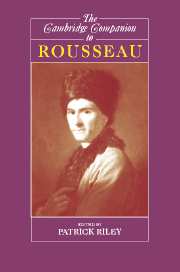Book contents
- Frontmatter
- 1 Introduction: Life and Works of Jean-Jacques Rousseau (1712-1778)
- 2 A General Overview
- 3 Rousseau, Voltaire, and the Revenge of Pascal
- 4 Rousseau, Fénelon, and the Quarrel between the Ancients and the Moderns
- 5 Rousseau's Political Philosophy: Stoic and Augustinian Origins
- 6 Rousseau's General Will
- 7 Rousseau's Images of Authority (Especially in La Nouvelle Heloise)
- 8 The Religious Thought
- 9 Émile: Learning to Be Men, Women, and Citizens
- 10 Émile: Nature and the Education of Sophie
- 11 Rousseau's Confessions
- 12 Music, Politics, Theater, and Representation in Rousseau
- 13 The Motto Vitam impendere vero and the Question of Lying
- 14 Rousseau's The Levite of Ephraim: Synthesis within A “Minor” Work
- 15 Ancient Postmodernism in the Philosophy of Rousseau
- Bibliography
- Index
9 - Émile: Learning to Be Men, Women, and Citizens
Published online by Cambridge University Press: 28 May 2006
- Frontmatter
- 1 Introduction: Life and Works of Jean-Jacques Rousseau (1712-1778)
- 2 A General Overview
- 3 Rousseau, Voltaire, and the Revenge of Pascal
- 4 Rousseau, Fénelon, and the Quarrel between the Ancients and the Moderns
- 5 Rousseau's Political Philosophy: Stoic and Augustinian Origins
- 6 Rousseau's General Will
- 7 Rousseau's Images of Authority (Especially in La Nouvelle Heloise)
- 8 The Religious Thought
- 9 Émile: Learning to Be Men, Women, and Citizens
- 10 Émile: Nature and the Education of Sophie
- 11 Rousseau's Confessions
- 12 Music, Politics, Theater, and Representation in Rousseau
- 13 The Motto Vitam impendere vero and the Question of Lying
- 14 Rousseau's The Levite of Ephraim: Synthesis within A “Minor” Work
- 15 Ancient Postmodernism in the Philosophy of Rousseau
- Bibliography
- Index
Summary
In the history of the philosophy of education, Rousseau is renowned as one of the founders of what is often both admired and vilified as “progressive” education. Yet Rousseau remains the most vehement critic of the idea of progress that he so rapidly identified as having become the new received wisdom of the forces of modernity that had set themselves to overturn the authority of tradition. That he should readily and persuasively be interpreted both as a voice of liberation and of conservatism is one reason for the perennial fascination with an author whose very paradoxes have a quality of consistency throughout his apparently varied output. Within education his fame rests on his contribution to the development of “child-centred” education with its attendant emphasis on the freedom of the child to develop at its own appropriate pace and on learning by discovery rather than by forms of imposition. His belief that in education the guiding principle should be to do the opposite to what was the prevailing method of schooling has often seemed to be the inspiration of many of the radical experiments in the rearing of children over the succeeding period. Yet any examination of Rousseau's writings on education will demonstrate that this advocate of child liberation was as deeply concerned with discipline, albeit in a different manner, as the most conservative of writers.
- Type
- Chapter
- Information
- The Cambridge Companion to Rousseau , pp. 247 - 271Publisher: Cambridge University PressPrint publication year: 2001
- 12
- Cited by



